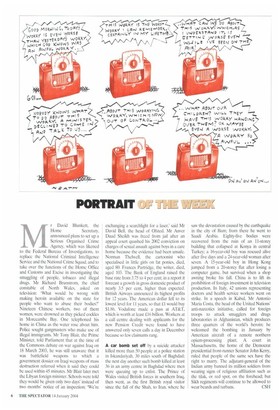M r David Blunkett, the
Home Secretary, announced plans to set up a Serious Organised Crime Agency, which was likened to the Federal Bureau of Investigations, to replace the National Criminal Intelligence Service and the National Crime Squad, and to take over the functions of the Home Office and Customs and Excise in investigating the smuggling of people, tobacco and illegal drugs. Mr Richard Brunstrom, the chief constable of North Wales, asked on television: 'What would be wrong with making heroin available on the state for people who want to abuse their bodies?' Nineteen Chinese workers, two of them women, were drowned as they picked cockles in Morecambe Bay. One telephoned his home in China as the water rose about him. Police sought gangrnasters who make use of illegal immigrants. Mr Tony Blair, the Prime Minister, told Parliament that at the time of the Commons debate on war against Iraq on 18 March 2003, he was still unaware that it was battlefield weapons to which a government dossier on Iraqi weapons of mass destruction referred when it said they could be used within 45 minutes. Mr Blair later met the Libyan foreign minister. Schools were told they would be given only two days' instead of two months' notice of an inspection; 'We're exchanging a searchlight for a laser,' said Mr David Bell, the head of Ofsted. Mr Anver Daud Sheikh was freed from jail after an appeal court quashed his 2002 conviction on charges of sexual assault against boys in a care home because the evidence had been unsafe. Norman Thelwell, the cartoonist who specialised in little girls on fat ponies, died, aged 80. Frances Partridge, the writer, died, aged 103. The Bank of England raised the base rate from 3.75 to 4 per cent; in a report it forecast a growth in gross domestic product of nearly 3.5 per cent, higher than expected. British Airways announced its highest profits for 12 years. The American dollar fell to its lowest level for 11 years, so that El would buy $1.86. Vodafone made a pass at AT&T, which is worth at least £16 billion. Workers at a call centre dealing with applicants for the new Pension Credit were found to have answered only seven calls a day in December because so few claimants rang.
A car bomb set off by a suicide attacker killed more than 50 people at a police station in Iskandariyah, 30 miles south of Baghdad; the next day another such bomb killed at least 36 in an army centre in Baghdad where men were queuing up to enlist. The Prince of Wales visited British forces in southern Iraq, then went, as the first British royal visitor since the fall of the Shah, to Iran, where he saw the devastation caused by the earthquake in the city of Barn; from there he went to Saudi Arabia. Eighty-five bodies were recovered from the ruin of an 11-storey building that collapsed at Konya in central Turkey; a 16-year-old boy was rescued alive after five days and a 24-year-old woman after seven. A 15-year-old boy in Hong Kong jumped from a 20-storey fiat after losing a computer game, but survived when a shop awning broke his fall. China is to lift its prohibition of foreign investment in television production. In Italy, 42 unions representing doctors and health service workers went on strike. In a speech in Kabul, Mr Antonio Maria Costa, the head of the United Nations' anti-narcotics initiative, called for foreign troops to attack smugglers and drugs laboratories in Afghanistan, which produces three quarters of the world's heroin; he welcomed the bombing in January by American aircraft of a remote northern opium-processing plant. A court in Massachusetts, the home of the Democrat presidential front-runner Senator John Kerry, ruled that people of the same sex have the right to many. The adjutant-general of the Indian army banned its million soldiers from wearing signs of religious affiliation such as the tilak, or red spot, on the forehead; but Sikh regiments will continue to be allowed to
wear beards and turbans. CSH


































































 Previous page
Previous page